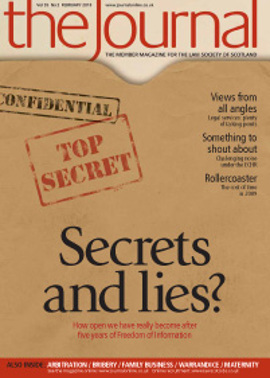Scottish Solicitors' Discipline Tribunal
Peter Fitzpatrick
A complaint was made by the Council of the Law Society of Scotland against Peter Fitzpatrick, solicitor, Glasgow (“the respondent”). The Tribunal found the respondent guilty of professional misconduct in respect of his conviction for a breach of the peace with a considerable sexual background which involved behaviour which fell short of the standards of honesty, truthfulness and integrity expected from members of the solicitors’ profession and which was a breach of article 7 of the Code of Conduct for Scottish Solicitors 2002. The Tribunal suspended the respondent from practice for a period of five years.
The Tribunal noted that the respondent’s conduct was a single isolated offence not directly pertaining to his work as a solicitor. The Tribunal had regard to the medical reports and noted that the offence was committed during a period when the respondent was being treated for a depressive illness. However, the public is entitled to expect a solicitor to be a person of integrity. A solicitor who falls short of the qualities of honesty, truthfulness and integrity to an extent that others regard his conduct as disgraceful or dishonourable in relation to the accepted ethical standards of the legal profession brings the profession as a whole into disrepute. The Tribunal considered that the respondent’s conviction demonstrated that the respondent’s conduct, albeit on one occasion, was not in accordance with the said standards.
The Tribunal noted that the conviction was widely reported in the media and that the profession as a whole was brought into serious disrepute. The Tribunal considered that the respondent had failed to maintain a standard of conduct and propriety expected of a member of an honourable profession and accordingly ordered the respondent to be suspended from practising for a period of five years with effect from the date of intimation of the findings.
James McRae
Five complaints were made by the Council of the Law Society of Scotland against James McRae, solicitor, formerly of Burntisland and now Edinburgh (“the respondent”). The Tribunal found the respondent guilty of professional misconduct in respect of his repeated failure to answer professional correspondence from the Society; his failure to obtemper statutory notices; his failure to account for funds received by him from a client; his repeated failure to answer correspondence from Balfour & Manson; his failure to secure settlement of agency fees and outlays; his failure to provide an accounting in relation to the funds paid to him by two clients; his continuing to practise as a solicitor between 2 May and 8 October 2008 in the knowledge that his practising certificate had been withdrawn and that he was suspended from practice, holding himself out to various persons as being entitled to practise as a solicitor, submitting claims to the Armed Forces Criminal Legal Aid Authority for payment of fees under the Legal Aid Scheme and receiving payments of fees for legal aid services provided during that period notwithstanding the suspension; his taking fees from a client’s executry without the consent of the executor; and his taking fees from the said executry on two occasions without a fee note being rendered to the executor. The Tribunal also found that the respondent had failed to comply with the determinations and directions given by the Council of the Society under s 42A of the Solicitors (Scotland) Act 1980 within the respective periods specified.
The Tribunal directed that orders be issued under s 53C of the Act and suspended the respondent from practice for a period of 10 years.
The Tribunal was extremely concerned that the respondent, knowing that he had already been restricted and also being fully aware that he had then been suspended, carried on working when he knew that it was a requirement that such work be undertaken by a solicitor. The Tribunal considered that this was a wilful disregard of the terms of s 23 of the 1980 Act. In doing so the respondent also misled the Armed Forces Legal Aid Authority, the Service Police and members of HM Forces. The Tribunal considered that such behaviour is regrettably disgraceful and dishonourable and is likely to bring the profession into disrepute. There was no medical evidence available to the Tribunal to suggest that the respondent was suffering from ill health or did not know what he was doing. The Tribunal was also concerned by the number of matters contained in the five complaints and also the fact that the respondent had previously appeared before the Tribunal for analogous matters in respect of failure to respond to the Society. The Tribunal stopped short of striking the respondent’s name from the roll as it was noted that the respondent had co-operated fully with the Society and entered into pleas in respect of the complaints. In the whole circumstances the Tribunal considered that a suspension from practice for a period of 10 years would be an appropriate penalty.
In this issue
- More prejudicial than probative?
- Another age
- Resolution is the key
- On the record
- Chequing out
- ABS workout
- Know your books
- Family business and business families
- Forum of choice?
- A right to silence?
- What does it mean to be a solicitor?
- Traineeships down over 25%
- Law reform update
- From the Brussels office
- Appreciation: Alfred Phillips
- Appreciation: John Sinclair
- Training for success
- From here... to maternity
- Ask Ash
- The move in-house - do you have what it takes?
- Big decisions
- Balancing exercise
- Belief boundaries
- Details, details, details
- Scottish Solicitors' Discipline Tribunal
- Website review
- Book reviews
- Tougher regime
- No guarantees?
- Title insurance for insolvency practitioners
- PSG update






